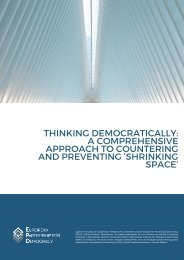Repression and resilience: Diagnosing closing space mid-pandemic
You also want an ePaper? Increase the reach of your titles
YUMPU automatically turns print PDFs into web optimized ePapers that Google loves.
REPRESSION AND RESILIENCE: DIAGNOSING CLOSING SPACE MID-PANDEMIC<br />
31<br />
<strong>and</strong> civic <strong>space</strong> more broadly in the long term. 114 A<br />
survey of European CSOs indicated that respondents<br />
were very worried (41%) or somehow worried (52%) that<br />
COVID-19 measures will continue to impact negatively<br />
on their operations <strong>and</strong> activities in the future. 115 The<br />
overstretching of civil society’s capacity accompanied<br />
by reduced donor support may endanger the protection<br />
of fundamental rights, particularly in countries where<br />
other forms of oversight were already compromised<br />
116 117<br />
before COVID-19.<br />
term impact on politics, but this could go two ways:<br />
government mismanagement of the p<strong>and</strong>emic <strong>and</strong><br />
economic crisis could inspire citizens to dem<strong>and</strong> more<br />
accountability <strong>and</strong> structural change, like in Kenya; or it<br />
could shift attention away from political change to basic<br />
needs <strong>and</strong> survival, like in Venezuela. This will ultimately<br />
depend in great part on the ability of political parties<br />
<strong>and</strong> civic movements to seize the opportunities of postp<strong>and</strong>emic<br />
recovery <strong>and</strong> translate citizens’ acute needs to<br />
concrete proposals for reform.<br />
Similarly, the deterioration of socio-economic inequalities<br />
<strong>and</strong> the adverse impact on women <strong>and</strong> disadvantaged<br />
populations will not be resolved by simply controlling<br />
the virus <strong>and</strong> risk further increasing the already<br />
unprecedented levels of inequality around the world. 118<br />
Inevitably, such socio-economic inequality will have<br />
repercussions on democratic representation <strong>and</strong> by<br />
extension democratic <strong>space</strong>, limiting opportunities<br />
for poorer segments of society, women <strong>and</strong> other<br />
underrepresented groups to participate in political<br />
processes. 119<br />
At a geopolitical level, the battle over which regimes<br />
deal with the p<strong>and</strong>emic best, is likely to further intensify<br />
tensions between Western democracies <strong>and</strong> autocracies<br />
like China <strong>and</strong> Russia. The p<strong>and</strong>emic could be a catalyst<br />
for democratic breakthroughs, state breakdown, an<br />
increase in hybrid regimes, or a starker division between<br />
democracies <strong>and</strong> autocracies globally. Regardless of<br />
the outcome, this will significantly shape international<br />
governance <strong>and</strong> cooperation. 120<br />
Lastly, the economic crisis will have a profound, long-<br />
Building back better for a democratic<br />
post p<strong>and</strong>emic future?<br />
While many of the implications of the health crisis are<br />
yet to be felt, countries are developing their recovery<br />
strategies <strong>and</strong> plans today, <strong>and</strong> are left at a crossroads<br />
with different possible scenarios for democratic <strong>space</strong><br />
in the future. Between the geopolitical fight between<br />
autocracies <strong>and</strong> democracies, <strong>and</strong> the domestic economic<br />
downturn, democratic voices have both flourished <strong>and</strong><br />
withered. The extent to which the acceleration of <strong>closing</strong><br />
<strong>space</strong> during the p<strong>and</strong>emic will be consolidated, will<br />
depend on the p<strong>and</strong>emic recovery. What kind of society<br />
do we rebuild <strong>and</strong> invest in?<br />
Some countries will build back to the way it was before.<br />
This will entail a return to the usual rate of attacks against<br />
defenders of democratic <strong>space</strong>, <strong>and</strong> a restoration of<br />
legislative <strong>and</strong> judicial oversight <strong>and</strong> reinstatement of<br />
fundamental freedoms. The threat of violence will have<br />
left its scars in activists’ collective memory, however, <strong>and</strong><br />
the boundaries of acceptable government behaviour<br />
114 International IDEA (2020): Taking Stock of Global Democratic Trends Before <strong>and</strong> During the COVID-19 P<strong>and</strong>emic. Available here.<br />
115 European Union Agency for Fundamental Rights (2021): “COVID-impact on civil society work: Results of consultation with FRA’s Fundamental<br />
Rights Platform”. Available here.<br />
116 Freedom House (2020): Democracy Under Lockdown: The Impact of COVID-19 on the Global Struggle for Freedom. Available here.<br />
117 Young, R. & Panchulidze, E. (2020): Global Democracy & COVID-19: Upgrading International Support. Available here.<br />
118 Goldin, I. & Muggah, R. (2020): “COVID-19 is increasing multiple kinds of inequality. Here’s what we can do about it”. Available here.<br />
119 Kurlantzick, J. (2021): COVID-19 <strong>and</strong> Its Effect on Inequality <strong>and</strong> Democracy: A Study of Five Large Democracies. Discussion paper for<br />
the Council on Foreign Relations. Available here.<br />
120 European Partnership for Democracy (2020): Imagined continuities: Political scenarios after the COVID-19 p<strong>and</strong>emic. Available here.

















